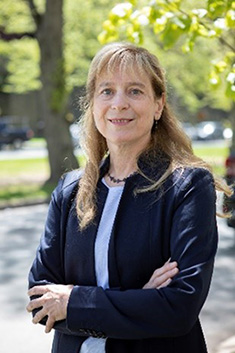A şÚÁĎłÔąĎÍřresearcher is making waves in the global medical community after a discovery that could help improve outcomes for people suffering from treatment-resistant bipolar depression.Ěý
A recently published paper by Dr. Cynthia Calkin, a clinical researcher and associate professor in the departments of psychiatry and medical neuroscience, has been chosen by the American Society of Clinical Psychopharmacology (ASCP) Awards Committee to receive theĚý.
The winning paper, titled "Treating Insulin Resistance with Metformin as a Strategy to Improve Clinical Outcomes in Treatment-Resistant Bipolar Depression (the TRIO-BD Study): A Randomized, Quadruple-Masked, Placebo-Controlled Clinical Trial," was published in the journal’s February 2022 issue.
For the approximately 20,000 people in Nova Scotia living with bipolar disorder, these findings are helping to change their lives by treating what was considered, until now, an unrelated and undiagnosed condition.
As a result of this research study, the Canadian Diabetes Association updated their guidelines to include bipolar depression as an independent risk factor for type 2 diabetes. Dr. Calkin and her colleagues now also recommend all bipolar patients be tested for insulin resistance. As a result of Dr. Calkin’s work, there are now new treatment options available to target underlying mechanisms of bipolar depression — options that have been shown to work when psychotropic drugs no longer do.Ěý
From treatment guidelines to the approach to clinical care for patients, this work has had extensive positive influence on those with treatment resistant bipolar disorder.
Road to recognition
Dr. Calkin, a graduate from Dalhousie’s Faculty of Medicine, is medical director of the Mood and Metabolism Program, a unique multidisciplinary clinical research program that includes psychiatry, endocrinology and metabolism, health physics, biomedical engineering, neuroradiology, and medical neuroscience. Her innovation and discovery research focuses on mechanisms underlying Treatment-Resistant Bipolar Disorder (TRBD) and novel mechanism-based targeted treatments.Ěý
 In 2021, Dr. Calkin (shown right) competed for what was formerly the şÚÁĎłÔąĎÍřMedical Research Foundation (DMRF) Influencers for Health Research Grant to help fund her mechanism-based research. The grant process called for a 10-minute pitch of her work to a group of local philanthropists who would then choose the researcher they wanted to fund; she won this competition and received a $50,000 award toward her research project.Ěý
In 2021, Dr. Calkin (shown right) competed for what was formerly the şÚÁĎłÔąĎÍřMedical Research Foundation (DMRF) Influencers for Health Research Grant to help fund her mechanism-based research. The grant process called for a 10-minute pitch of her work to a group of local philanthropists who would then choose the researcher they wanted to fund; she won this competition and received a $50,000 award toward her research project.Ěý
Thanks to funding like that, Dr. Calkin and her team’s research progressed and today has led to a new approach focused on identifying pathophysiologic mechanisms underlying treatment resistance in bipolar depression. They were the first to find that insulin resistance exists at high rates in people with bipolar depression — 32 per cent of patients with bipolar depression were insulin resistant while 22 per cent were type 2 diabetic, which is three times higher than the general population.Ěý
Further, insulin resistance and type 2 diabetes are independently linked to worse bipolar disorder outcomes. Her team’s TRIO-BD study (funded by a $1.3-million dollar grant from the Stanley Medical Research Institute) showed that reversing insulin resistance improved psychiatric outcomes in treatment-resistant bipolar disorder patients.
Recommended reading:ĚýLancet report calls for whole-of-society response to reduce burden of depression — an overlooked and underfunded crisis
Renewed hope
Dr. Calkin is hearing from patients and their families that it has given even the sickest of those affected renewed hope.Ěý
“I have learned through patients emailing me that our research has been featured on YouTube and TikTok as well” Dr. Calkin says, “so we are also reaching the public who need to know there is a completely new and successful way of treating treatment resistant bipolar disorder.”Ěý
Not only has this research gained recognition in the medical community andĚý, but she has been asked to speak at several conferences, as well as onĚý.
Each year, the American Society of Clinical Psychopharmacology (ASCP) presents the Paul Wender Best Paper in The Journal of Clinical Psychiatry Award to a recipient who has been published in the past year for The Journal of Clinical Psychiatry. Dr. Calkin is honoured to receive this distinguished international award, “on behalf of my research team, I would like to thank all of you who have supported our research.”
Learn more about Dr. Calkin’s research at DalĚý.

